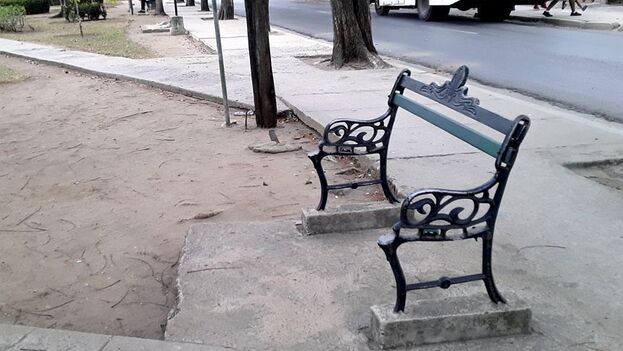
![]() 14ymedio, Juan Izquierdo, Havana, 7 March 2023 — Based on the robberies and vandalism, the inhabitants of Las Tunas are “dismantling” the city’s public spaces. The list of “reprehensible” acts, as the official press called them this Monday, is extensive: garbage dumps, destruction of buildings, theft of furniture and corruption in state establishments.
14ymedio, Juan Izquierdo, Havana, 7 March 2023 — Based on the robberies and vandalism, the inhabitants of Las Tunas are “dismantling” the city’s public spaces. The list of “reprehensible” acts, as the official press called them this Monday, is extensive: garbage dumps, destruction of buildings, theft of furniture and corruption in state establishments.
The most alarming situation is going on at the provincial hospital, which, according to its directors, treats more than 7,000 patients daily. “The light bulbs, the screws for the window panes and the panes themselves have been stolen,” denounced Carlos Pérez Santiesteban, deputy clinical-surgical director of the center.
The people who accompany the patients take advantage of their stay in the hospital, according to the doctor, to get hold of what they find, from a piece of metal to the chair braces. To make matters worse, the doctor complains, “stretchers and wheelchairs are abused, mattresses are unprotected, food is eaten on the beds and liquids are spilled.”
Pérez, who describes the ability to control the situation as “difficult,” also regrets that people steal or destroy the installation’s switches, and that they intentionally dump waste in the corridors, bathrooms and gutters of the building. In addition, they habitually scratch the walls, smearing them with grease and damaging the paint.
According to the press, the “fury” of the people from Las Tunas has an explanation: they behave “as if they were bothered” by the good condition of public spaces. It is no longer a question of neglect, but of vandalizing what cannot be transported to homes, such as park benches or the walls of a building.
“In a bakery, for example, flour and oil are stolen and sold in the same neighborhood.” Nobody has scruples when it comes to “taking advantage” of public goods
Las Tunas, the report states, “has large bills” related to “collective property,” and attributes it to a “a training problem” to young people that later in life affects their adult behavior. However, it does not mention at any time the deficiencies and shortages – common throughout the country but exacerbated in the eastern provinces – that have triggered crime rates in Cuba, although they]se do not justify other behaviors such as dirtying and vandalizing hospital facilities.
There are people who even steal marble pieces “to make a grinder for spices and meat,” an astonished citizen of Las Tunas said. He was recently interviewed by the official press, which also publishes photographs of the “ragged sites” of the city. Almost all the benches at the Plaza Calé are missing their slats, while the metal railings of the Colón Street bridge –whose potholes are a danger to traffic– have been sawn off and stolen.
The fence of the Hermanos Ameijeiras Airport is in the same sorry state, whose wires and poles, already damaged by rust, have been cut and “recycled” in homes.
“Everyone here ‘struggles’, cautiously states one of the interviewees in the official report. “In a bakery, for example, flour and oil are stolen and sold in the same neighborhood.” No one has scruples when it comes to “taking advantage of” public goods, it doesn’t matter if they are food or construction materials –rebar, stones, bricks– that are already part of some structure. That notion, he admits, is even “accepted.”
Another problem is the city’s state of hygiene, to which the local newspaper has referred on other occasions. The amount of garbage in the streets, the puddles of urine in squares and parks, and the fact that almost all the garbage transportation of the waste depends on horse-drawn carts – for which Community Services pays little and late – increase the population’s discomfort.
The “latest fashion,” the newspaper claims, is breaking bottles and leaving the glass shards on the streets, which are already littered with excrement, paper and potholes. At the height of the problem, the text devotes several paragraphs to giving lessons in “socialist morality” and civility to the people of Las Tunas, whose attitude cannot be explained and who will end up, he insists, by leaving only “bits and pieces” of the city.
Translated by Norma Whiting
____________
COLLABORATE WITH OUR WORK: The 14ymedio team is committed to practicing serious journalism that reflects Cuba’s reality in all its depth. Thank you for joining us on this long journey. We invite you to continue supporting us by becoming a member of 14ymedio now. Together we can continue transforming journalism in Cuba.
